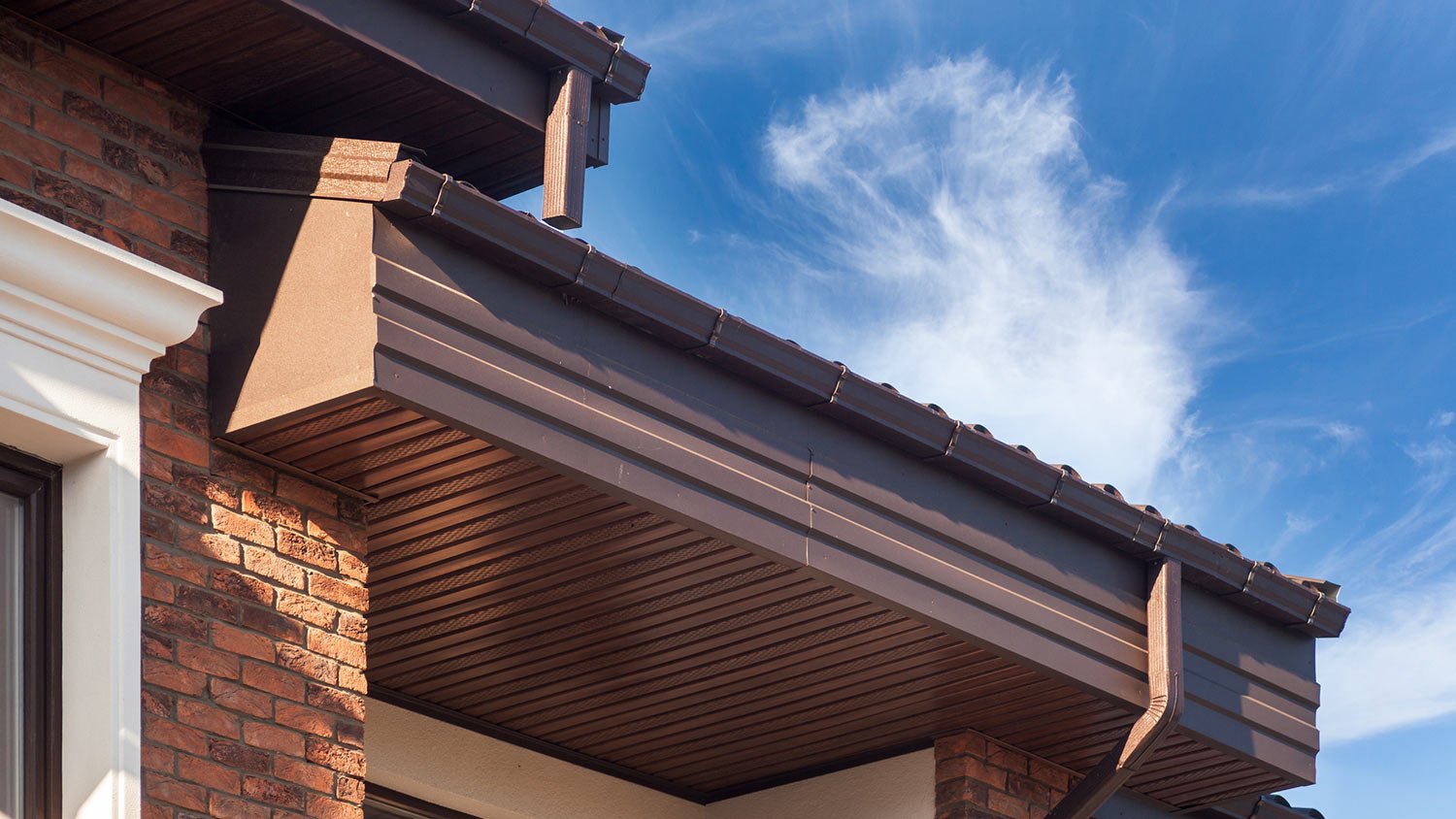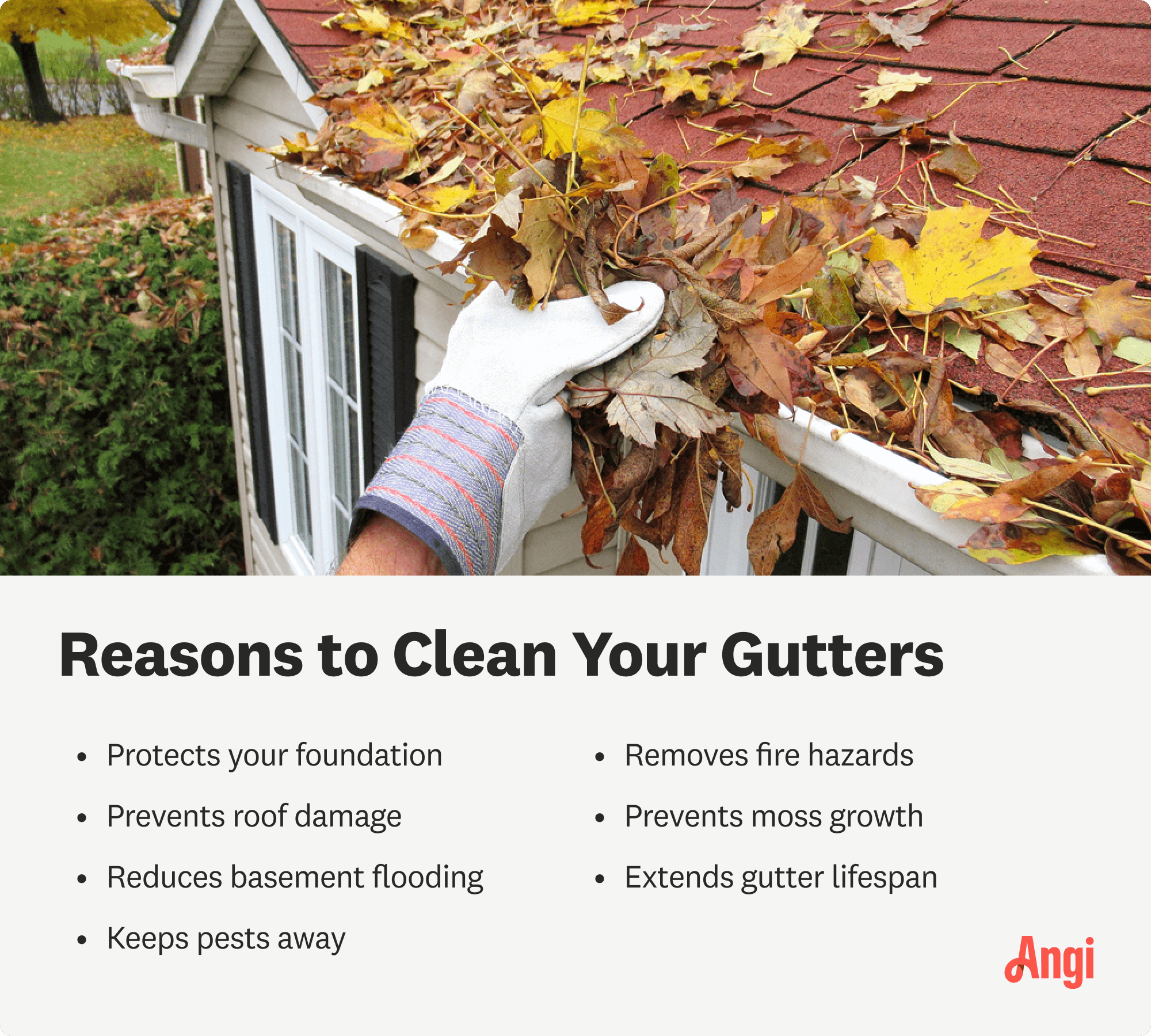
This guide to gutter cleaning costs provides estimates for cleaning different types of gutters, tips for saving money on gutter cleaning, and answers to how to clean gutters.
Clogged gutters can lead to more than just a day spent cleaning up wet leaves


Clogged gutters prevent water from draining properly, causing runoff to pool around your foundation and seep into basements through cracks and joints.
Water damages foundations by creating hydrostatic pressure that weakens surrounding soil and causes breaks, while also eroding soil and rotting wooden support structures.
Clean your gutters twice per year and after heavy storms to prevent clogs from leaves and debris that can lead to water overflow and foundation damage.
Gutter guards can help prevent clogs by reducing debris buildup, and proper downspout installation should direct water at least 10 feet away from your home.
A damp basement and excess water in your foundation can lead to many problems, from damaged keepsakes to peeling paint to mold or even actual structural damage. There are many ways water can get into your basement, but one of the biggest culprits is often preventable: clogged gutters. Find out how clogged gutters can weaken your foundation and how to avoid it.
You’re probably pretty acquainted with the look of your gutters by now but may not know exactly what they do. Simply put, the purpose of your gutter system is to guide rainwater or water from snowmelt off of your home’s roof. The gutters slope toward a downspout, which either directs water away from the house or connects to an underground drainage system such as a French drain. During heavy storms or runoff, the gutters will protect your foundation from water damage.
Water damages a home’s foundation by weakening the surrounding soil and exerting pressure on its walls. Known as hydrostatic pressure, standing water can seep into the foundation's pores and cause breaks.
If water pools too close to the foundation of your house, it can cause soil erosion, which can further weaken the structure of your home. The water damage can also cause rot and weakness in joists, basement columns, and other wooden structures that support your home.
When gutters get clogged, they cannot perform the basic functions outlined above, which can lead to basement flooding. Water runoff from your roof should travel through your gutters and then be directed at least 10 feet away from your house. If your gutter system is clogged, this can create a block that forces water to drain down the side of your home, where it pools around the foundation. The water can seep into your basement through cracks in the slab foundation or leak through joints, masonry, and concrete.

Clogged gutters happen when debris, such as twigs and leaves, builds up over a season. It is important to inspect and clean your gutters regularly to prevent clogs. A good rule of thumb is to clear clogged gutters any time you notice an obstruction that causes water overflow, such as after a heavy storm. But having a pro clear your gutters twice per year is a good frequency of gutter cleaning.
Gutter guards, also known as gutter screens, covers, or helmets, can help prevent clogs by reducing debris that can get into the gutters themselves.
If you just can’t reach your gutters to clean them or would rather spend the day relaxing on the couch, you can contact a local gutter cleaning professional to get the job done right.
In short, the best gutter system is one with downspouts that direct water away from your home and has no leaks or damage. With that in mind, you can choose the best gutter systems for you based on cost, as well as appearance. These systems also come in different gauges and in various materials, including vinyl, steel, aluminum, and copper.
If you are considering installing a new gutter system, it is important to talk to a local gutter installer. They can ensure that the gutters slope enough to direct water off your roof and that your downspouts are installed correctly. From there, as long as you regularly clean and inspect your gutters, you can rest easier knowing your home is safe and dry.
If you suspect your foundation has water damage, you should immediately reach out to a professional foundation repair company. They can come out and do an emergency assessment to diagnose the problem and advise on the best next steps.
You should also contact your homeowner's insurance agent to learn about your coverage options for water damage. Depending on the extent of damage, you may need to call a water damage remediation company to get ahead of mold problems.

There are several ways you can help keep water out of your basement. These include:
Regularly inspecting and cleaning your gutters
Properly installing gutters and downspouts
Providing good drainage around the foundation, including drain tiles or French drains
Using landscaping techniques to direct water away from your foundation
Grading the surface around your home to direct water away from your foundation
Installing a sump pump in the basement to pump out excess groundwater around the foundation
From average costs to expert advice, get all the answers you need to get your job done.

This guide to gutter cleaning costs provides estimates for cleaning different types of gutters, tips for saving money on gutter cleaning, and answers to how to clean gutters.

What is gutter cleaning, and why is it important? From benefits and cost to recommended cleaning frequency, we bring you essential gutter cleaning basics you need to know.

Gutter guards won’t completely protect your gutters against debris, but they make clean-up a lot easier. Learn how you can clean gutters with gutter guards.

Your gutters only need routine cleaning twice a year to stop bigger issues. Find out the eight problems your clogged gutters could cause in your home.

If you’re wondering when the best time to clean gutters is, the answer depends on your climate and the number and type of trees around you. Our guide breaks it all down.

Harvesting your own rainwater is surprisingly simple. A rain barrel costs very little compared to how much you’ll save—and Mother Earth will thank you, too.